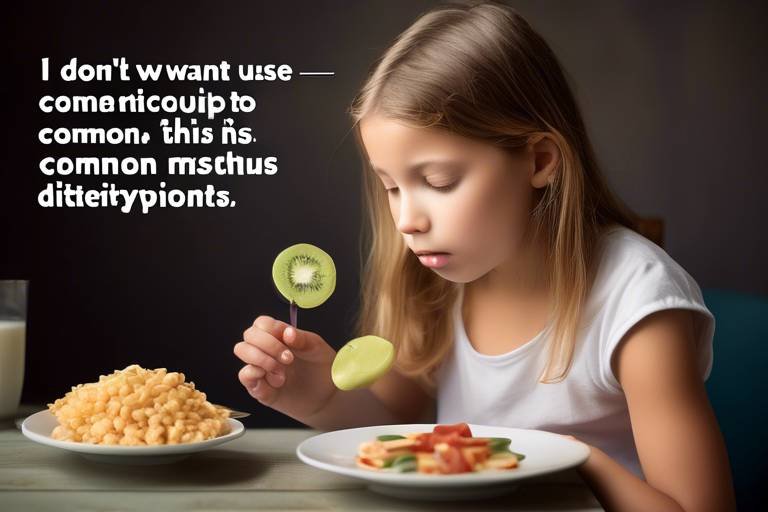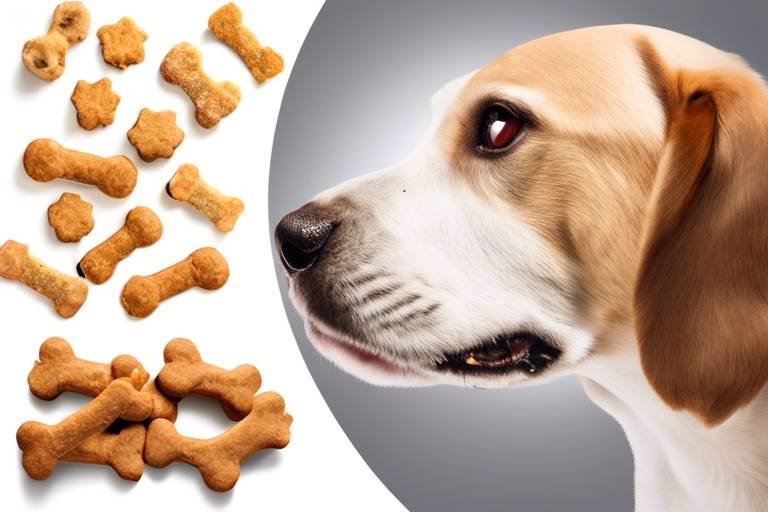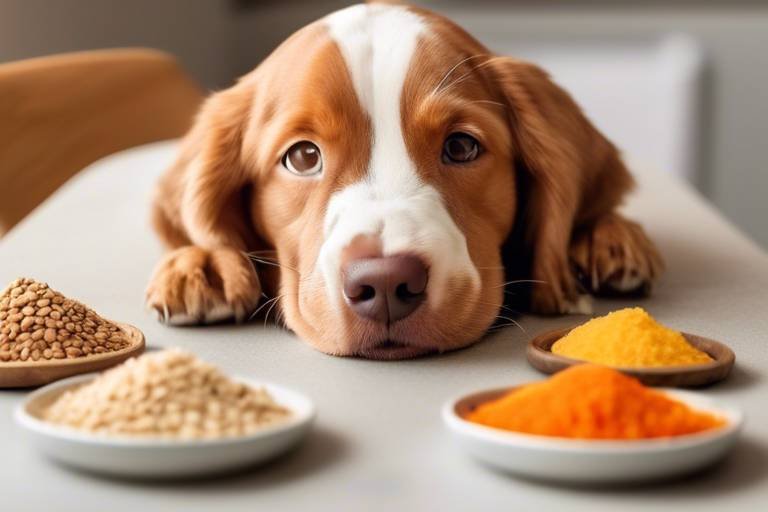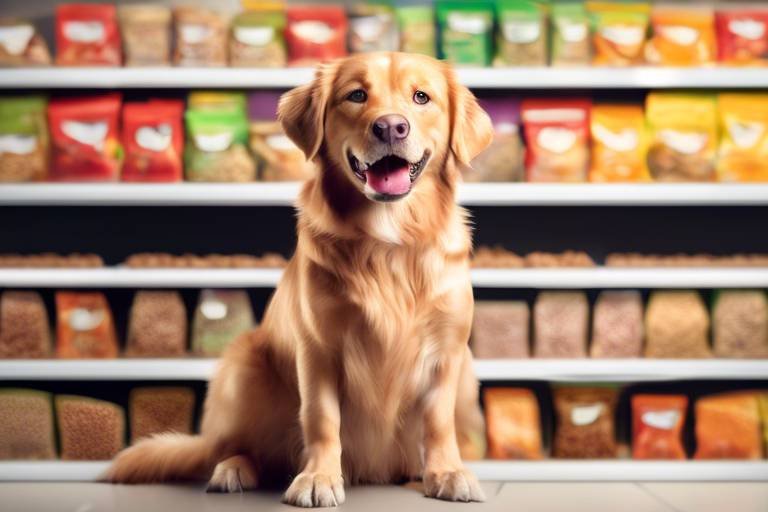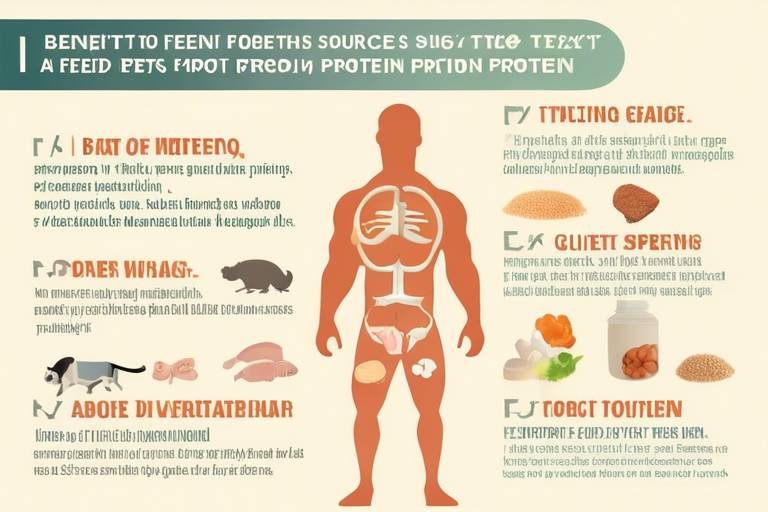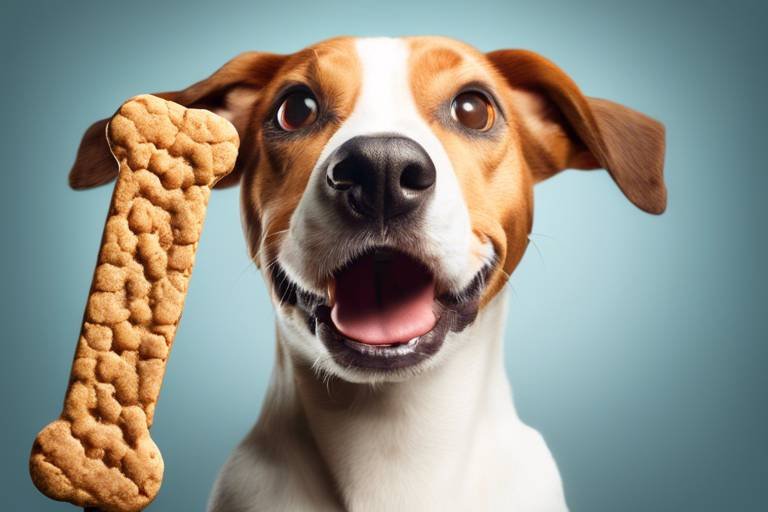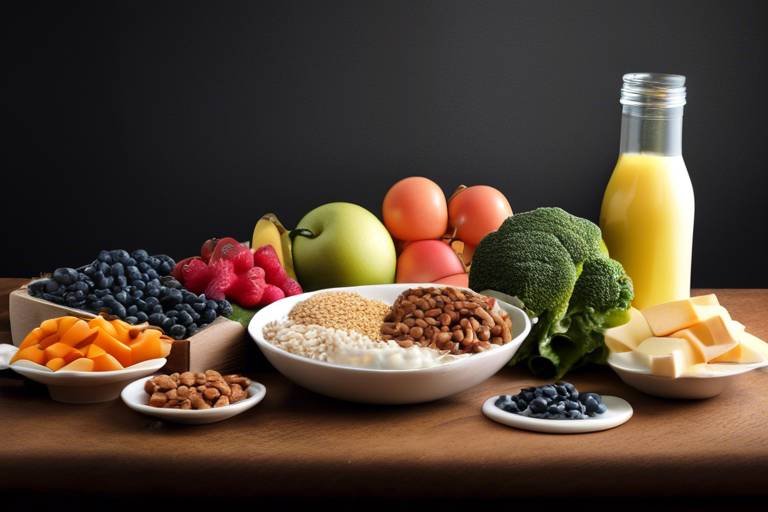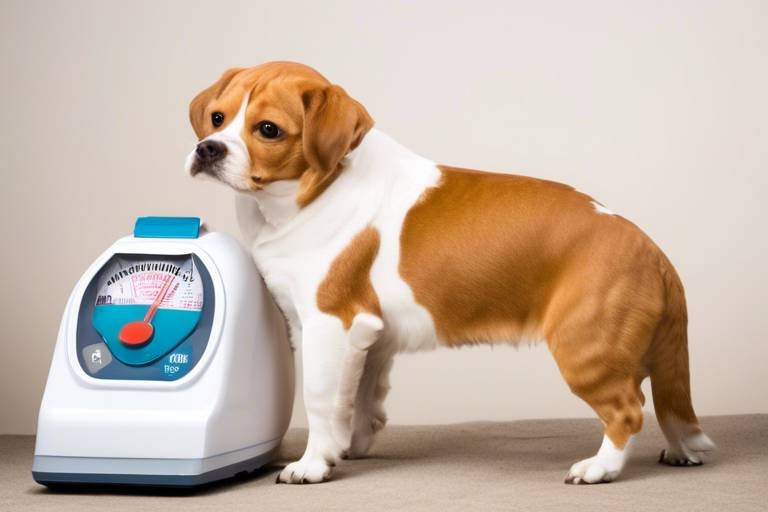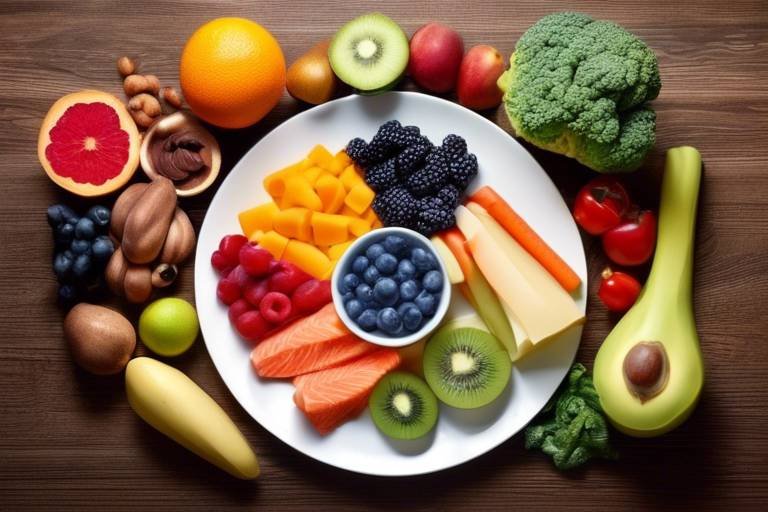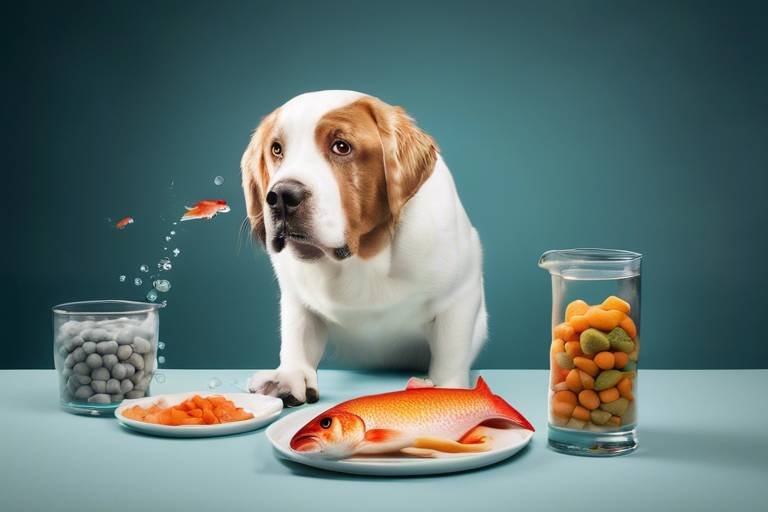The Importance of Consulting a Vet for Nutritional Advice
When it comes to our beloved pets, ensuring they receive the right nutrition is as crucial as giving them love and shelter. Veterinarians are not just doctors for our furry friends; they are also the gatekeepers of proper pet nutrition. Consulting a vet for nutritional advice can be a game-changer for your pet's health and well-being. Just like humans, pets have unique dietary needs that can change with age, activity level, and health status. Imagine feeding your pet the same food throughout their life—it's like expecting a toddler to thrive on adult meals! That's why understanding the intricacies of pet nutrition is essential, and who better to guide you than a vet?
Veterinarians have a wealth of knowledge about the specific dietary requirements of different species, breeds, and life stages. They can help you navigate the often confusing world of pet food labels, ingredient lists, and nutritional claims. With the rise of various diets—from grain-free to raw food—it's easy for pet owners to feel overwhelmed. This is where the expertise of a vet becomes invaluable. They can help you decipher what’s best for your pet, ensuring they get a balanced diet that supports their overall health.
Moreover, vets can identify any potential health issues related to nutrition. For instance, some pets might have allergies or intolerances that require special diets. A vet can guide you in choosing the right food to avoid these issues, ensuring your pet remains happy and healthy. Think of it this way: just as you wouldn’t consult a random person about your own health, why would you do the same for your pet? A vet's advice can be the difference between a thriving pet and one that struggles with health issues.
In addition, consulting a vet can save you money in the long run. While premium pet foods may seem expensive upfront, they can prevent costly health problems down the line. By investing in your pet's nutrition now, you could avoid expensive vet bills later. It’s all about making informed choices that benefit your pet’s health and your wallet!
In conclusion, the role of a veterinarian in your pet's nutritional journey cannot be overstated. They are equipped with the knowledge and experience to help you make the best dietary choices for your furry companions. So, the next time you're unsure about what to feed your pet, remember that a quick consultation with your vet could lead to a healthier, happier life for your four-legged friend.
- Why should I consult a vet for my pet's nutrition? Consulting a vet ensures that your pet receives a balanced diet tailored to their specific needs, which can prevent health issues.
- What are some common nutritional deficiencies in pets? Common deficiencies include lack of protein, vitamins, and minerals, which can lead to various health problems.
- Can I switch my pet's diet without consulting a vet? It's not advisable to switch diets without consulting a vet, as sudden changes can upset your pet's digestive system.
- How often should I consult a vet about my pet's diet? Regular check-ups, at least annually, are recommended, but you should consult your vet anytime your pet's health or lifestyle changes.

This article highlights the critical role veterinarians play in ensuring the optimal nutrition of pets. It discusses various aspects of veterinary nutritional advice and its benefits for pet health.
When it comes to our furry friends, understanding pet nutrition is crucial for their overall health and well-being. Just like humans, pets require a balanced diet that includes a variety of essential nutrients to thrive. These nutrients can be broadly categorized into proteins, carbohydrates, fats, vitamins, and minerals. Each of these components plays a unique role in maintaining your pet's health. For instance, proteins are vital for muscle development and repair, while fats provide energy and support cell function.
Moreover, the dietary needs of pets can vary significantly based on factors such as species, age, activity level, and health status. For example, a growing puppy has different nutritional requirements compared to a senior dog. Puppies need higher protein levels to support their rapid growth, while older dogs may require a diet lower in calories to maintain a healthy weight. It's essential to provide a balanced meal that meets these specific needs, as this can help prevent a range of health issues down the line.
To give you a clearer picture, let's take a look at a simple breakdown of the essential nutrients:
| Nutrient | Function | Sources |
|---|---|---|
| Proteins | Build and repair tissues | Meat, fish, eggs |
| Carbohydrates | Provide energy | Grains, fruits, vegetables |
| Fats | Energy source and nutrient absorption | Fish oil, chicken fat |
| Vitamins | Support various bodily functions | Fruits, vegetables, supplements |
| Minerals | Bone health, nerve function | Meat, dairy, greens |
Understanding these nutrients is just the beginning. It's also important to recognize that not all pet foods are created equal. Some commercial pet foods may lack the necessary balance or quality of ingredients, which is why consulting a veterinarian is vital. A vet can help you choose the right food that meets your pet's specific needs, ensuring that they receive the nutrients they require for a healthy and active life.
In addition to selecting the right food, it's essential to consider your pet's feeding schedule and portion sizes. Overfeeding or underfeeding can lead to obesity or malnutrition, respectively. A vet can provide personalized advice on how much and how often to feed your pet based on their unique circumstances.
In conclusion, understanding pet nutrition is a multifaceted endeavor that requires attention to detail and a willingness to learn. By consulting a veterinarian, you can ensure that your beloved pet receives the best possible nutrition tailored to their specific needs, paving the way for a long and healthy life.
This section debunks prevalent myths surrounding pet nutrition, helping pet owners make informed decisions and avoid misconceptions that could harm their pets' health.
Exploring the pros and cons of grain-free diets for pets, including potential health risks and benefits, and when such diets might be appropriate.
Understanding the difference between food allergies and intolerances in pets can guide owners in selecting the right diet for their furry companions.
A discussion on the advantages and disadvantages of commercial pet foods compared to homemade diets, emphasizing the importance of proper nutritional balance.
Highlighting the specific nutritional needs of pets at different life stages, from puppies and kittens to seniors, and how consulting a vet can help tailor diets accordingly.
Recognizing the signs of nutritional deficiencies in pets can prevent serious health issues. This section outlines common symptoms and when to seek veterinary advice.
Understanding the importance of weight management in pets, including strategies for maintaining a healthy weight and the role of veterinary guidance in achieving this goal.
Addressing the unique nutritional requirements of pets with health conditions, such as diabetes or kidney disease, and the critical role of a vet in managing these diets.
Exploring the specialized role of veterinary nutritionists in providing tailored dietary plans and advice, ensuring pets receive the best possible nutrition for their health needs.
In this section, we will address some common questions pet owners have regarding pet nutrition.

When it comes to pet nutrition, misinformation can spread like wildfire, leading pet owners down the wrong path. Understanding these common nutritional myths is crucial for anyone who wants to ensure their furry friends are getting the best possible care. For instance, one prevalent myth is that all human food is bad for pets. While it's true that certain foods, like chocolate and onions, can be toxic, many human foods, such as plain cooked chicken or carrots, can actually be healthy treats for pets. The key is knowing which foods are safe and which are not.
Another myth that often circulates is the belief that grain-free diets are inherently better for pets. This misconception can lead to owners choosing diets that may not provide balanced nutrition. In reality, grains can be a valuable source of energy and nutrients for many pets. It’s important to consult with a veterinarian to determine whether a grain-free diet is appropriate for your pet's specific needs or if it could pose potential health risks.
Some pet owners also believe that their pets should eat the same diet throughout their lives. This is a dangerous assumption! Just like humans, pets have different nutritional requirements at various life stages. Puppies and kittens require higher protein levels for growth, while senior pets may benefit from diets lower in calories but enriched with joint-supporting nutrients. Consulting a veterinarian can help tailor a diet that meets your pet's unique needs as they age.
Additionally, the myth that homemade diets are always superior to commercial pet foods is another misconception. While homemade diets can be beneficial, they must be carefully balanced to ensure they meet all of a pet's nutritional needs. Many commercial pet foods are formulated by experts and can provide a complete diet. It's essential to evaluate the nutritional adequacy of any homemade diet with a veterinarian to avoid deficiencies.
Lastly, there’s a common belief that pets should eat as much as they want and that they will self-regulate their intake. While some animals may have a good sense of their dietary needs, many pets can overeat, leading to obesity. This is where veterinary guidance comes into play, helping to establish a healthy feeding routine and portion control to maintain a healthy weight.
In summary, debunking these myths is vital for pet owners. By seeking the right advice and being informed, you can help ensure that your pet enjoys a long, healthy, and happy life. Always remember: when in doubt, consult your veterinarian!
- What are some signs my pet might have a nutritional deficiency?
Common signs include lethargy, poor coat condition, and changes in appetite. If you notice these symptoms, consult your vet. - Can I feed my pet human food?
Yes, some human foods are safe, but always check with your vet to ensure they are appropriate for your pet. - How often should I consult my vet about my pet's diet?
It's best to consult your vet at least once a year, or more frequently if your pet has special dietary needs or health concerns.
In recent years, the trend of grain-free diets for pets has gained significant popularity, sparking a heated debate among pet owners and veterinarians alike. Many believe that eliminating grains from their pets' diets can lead to better health and improved energy levels. But is this really the case? To understand the implications of a grain-free diet, we need to explore both the pros and cons associated with this dietary choice.
On one hand, advocates of grain-free diets argue that these meals can be more aligned with a pet's natural eating habits. Dogs and cats, being descendants of wild carnivores, may not have evolved to digest grains effectively. This perspective suggests that a diet rich in protein and low in carbohydrates could be more beneficial. For example, a grain-free diet often includes ingredients like meat, fish, and vegetables, which can provide essential amino acids and nutrients that support overall health.
However, it’s crucial to note that not all grains are harmful. In fact, grains like brown rice, oats, and barley can be excellent sources of energy and fiber. They can also contribute to a balanced diet when included in appropriate amounts. The challenge arises when some pets are fed diets that completely exclude grains, potentially leading to nutritional imbalances. It is essential to ensure that your pet’s diet is well-rounded, regardless of whether it includes grains or not.
Another significant concern with grain-free diets is the potential health risks associated with them. Recent studies have linked certain grain-free diets to a rise in cases of canine dilated cardiomyopathy (DCM), a serious heart condition. While the exact cause is still under investigation, it raises a red flag for pet owners considering this dietary approach. It’s vital to consult with a veterinarian before making any drastic changes to your pet's diet.
When evaluating whether a grain-free diet is appropriate for your pet, consider the following factors:
- Age: Puppies and kittens have different nutritional needs compared to adult or senior pets.
- Health Status: Pets with specific health concerns may require special dietary considerations.
- Activity Level: Active pets may benefit from higher protein and fat content, which can be found in certain grain-free options.
Ultimately, the decision to adopt a grain-free diet should not be taken lightly. It’s essential to conduct thorough research and, most importantly, consult with your veterinarian. They can help you navigate the complexities of pet nutrition and determine the best dietary plan tailored to your furry friend’s unique needs.
1. Can all pets benefit from a grain-free diet?
While some pets may thrive on a grain-free diet, others may not require such a dietary change. Always consult your veterinarian to assess your pet's specific needs.
2. Are there any risks associated with grain-free diets?
Yes, recent studies suggest a potential link between grain-free diets and certain health issues, including canine dilated cardiomyopathy (DCM). It's crucial to monitor your pet's health and consult with a vet.
3. How can I ensure my pet's diet is balanced?
To maintain a balanced diet, include a variety of protein sources, fruits, and vegetables. Consulting a veterinary nutritionist can also provide tailored advice for your pet’s dietary needs.
When it comes to our beloved pets, understanding their dietary needs can sometimes feel like navigating a maze. One of the most confusing aspects is distinguishing between food allergies and food intolerances. While both conditions can lead to discomfort and health issues, they stem from different causes and require different approaches to management.
Food allergies occur when a pet's immune system mistakenly identifies a harmless substance as a threat. This triggers an immune response that can result in a range of symptoms, including itching, swelling, and gastrointestinal distress. Common allergens include proteins like beef, chicken, and dairy. Imagine your pet's immune system as a vigilant guard dog; when it senses a 'threat,' it reacts aggressively, causing inflammation and discomfort.
On the other hand, food intolerance is a non-immune response to certain foods. It often arises from the pet's inability to properly digest a particular ingredient. For instance, some pets may struggle to break down certain grains or fats, leading to symptoms like gas, bloating, or diarrhea. Think of food intolerance like a friend who just can't handle spicy food—while the dish isn't harmful, it certainly doesn't agree with them!
To help pet owners better understand these two conditions, here’s a quick comparison:
| Aspect | Food Allergies | Food Intolerances |
|---|---|---|
| Immune Response | Yes | No |
| Common Symptoms | Itching, swelling, vomiting | Gas, bloating, diarrhea |
| Onset of Symptoms | Can be immediate or delayed | Usually delayed |
| Treatment | Avoidance of allergens, possible medication | Dietary adjustments |
Recognizing the signs of each condition is crucial for proper management. If you suspect your pet is experiencing either allergies or intolerances, consulting your veterinarian is essential. They can conduct tests and recommend the best course of action, which may include dietary changes or specialized diets to ensure your pet remains healthy and happy.
In conclusion, understanding the difference between allergies and intolerances is vital for your pet's well-being. By being informed, you can make better dietary choices that will keep your furry friend thriving!
- What are the common signs of food allergies in pets? Symptoms can include itching, redness, swelling, and gastrointestinal upset.
- How can I determine if my pet has a food intolerance? Look for signs like bloating, gas, or diarrhea after eating specific foods.
- Can pets outgrow food allergies? While some pets may develop new allergies, others may outgrow certain ones, but it's best to consult with your vet.
- Are there tests available for diagnosing food allergies? Yes, veterinarians can perform skin tests or blood tests to help identify allergens.
When it comes to feeding our beloved pets, the debate between commercial and homemade diets is one that many pet owners grapple with. On one hand, commercial pet foods are designed to meet specific nutritional standards and are often fortified with vitamins and minerals. They offer convenience and consistency, which can be a lifesaver for busy pet owners. However, the question remains: are these store-bought options truly the best for our furry friends?
On the flip side, homemade diets can be tailored to meet the unique needs of individual pets. This means you can control the ingredients, ensuring that your pet is getting the freshest and most nutritious options available. For instance, if your dog has a sensitivity to certain fillers or preservatives, preparing meals at home allows you to avoid these potential allergens. But, creating a balanced homemade diet requires knowledge and careful planning. It's crucial to ensure that you're providing all the essential nutrients your pet needs to thrive.
To help you weigh the pros and cons, let's take a closer look at some key differences:
| Aspect | Commercial Diets | Homemade Diets |
|---|---|---|
| Convenience | Ready to serve, easy to store | Requires preparation and planning |
| Nutritional Balance | Formulated to meet standards | Must be carefully balanced |
| Ingredient Control | Limited control over ingredients | Full control over every component |
| Cost | Varies widely, generally lower | Can be more expensive due to fresh ingredients |
Ultimately, the choice between commercial and homemade diets depends on your pet's specific needs, your lifestyle, and your comfort level with pet nutrition. Consulting with a veterinarian can provide invaluable guidance in making the right decision. They can help you understand the nutritional requirements for your pet's age, size, and health condition, ensuring that whichever path you choose, your pet remains healthy and happy.
Q: Can I mix commercial and homemade diets?
A: Yes, many pet owners choose to do this. However, it's essential to ensure that the meals are balanced and that you're not overfeeding your pet.
Q: Are homemade diets more nutritious than commercial ones?
A: Not necessarily. Homemade diets can be nutritious if well-planned, but they require careful consideration to meet all nutritional needs. Commercial diets are formulated to provide balanced nutrition.
Q: How do I know if my pet's diet is balanced?
A: Regular consultations with your veterinarian can help you assess your pet's diet and make necessary adjustments. Monitoring your pet's health and weight is also crucial.
Navigating the nutritional needs of your pet can feel like trying to solve a puzzle with missing pieces. Each phase of your pet's life brings its own unique set of requirements that are crucial for their health and longevity. Just like humans, pets undergo significant changes as they grow, from the playful antics of puppies and kittens to the more sedate lifestyle of senior pets. Therefore, understanding life stage nutrition is essential for any responsible pet owner.
For instance, puppies and kittens require a diet rich in protein and calories to support their rapid growth and energy levels. This is akin to how a toddler needs more nutrients than an adult. In contrast, adult pets need a balanced diet that maintains their weight and supports their activity levels. Senior pets, on the other hand, may require a diet lower in calories but higher in certain nutrients like fiber and antioxidants to help with digestion and to combat aging.
Here’s a breakdown of the nutritional needs at various life stages:
| Life Stage | Nutritional Focus |
|---|---|
| Puppies/Kittens | High protein and calorie intake for growth |
| Adults | Balanced diet for maintenance and energy |
| Seniors | Lower calories, higher fiber, and antioxidants |
When it comes to formulating the right diet for your pet at any life stage, consulting a veterinarian is invaluable. They can provide tailored advice based on your pet’s specific needs, activity level, and health conditions. For example, if your dog is a couch potato, they may not need as many calories as a dog that runs every day. This personalized approach ensures that your pet receives the right balance of nutrients to thrive.
Moreover, pets can experience various health issues as they age, which may necessitate changes in their diet. For instance, a dog diagnosed with arthritis may benefit from a diet enriched with omega-3 fatty acids to help manage inflammation. This is where the expertise of a veterinarian becomes critical; they can guide you in making the right dietary adjustments that cater to your pet's evolving health needs.
In conclusion, understanding the nutritional requirements at different life stages is not just about feeding your pet; it’s about enhancing their quality of life. By consulting with a veterinarian, you can ensure that your furry friend receives the best nutritional support tailored to their specific life stage, ultimately leading to a happier, healthier pet.
- What are the signs my pet needs a dietary change? Look for changes in weight, energy levels, or coat condition.
- Can I feed my pet homemade food? Yes, but consult a vet to ensure it meets all nutritional needs.
- How often should I consult my vet about my pet's diet? At least once a year or whenever you notice significant changes in your pet's health.

Just like us, our furry friends can suffer from nutritional deficiencies that can lead to serious health issues if left unaddressed. Recognizing the signs of these deficiencies is crucial for maintaining your pet's overall health and well-being. Have you ever noticed your pet acting differently? Or perhaps they've been shedding more fur than usual? These could be red flags indicating that their diet isn't meeting their nutritional needs.
Common signs of nutritional deficiencies can manifest in various ways. For instance, poor coat condition is often one of the first indicators. If your pet's fur is dull, brittle, or thinning, it might be a sign that they are lacking essential fatty acids or other nutrients. Additionally, weight changes—whether your pet is losing weight unexpectedly or becoming overweight—can also signal dietary issues. It's important to monitor their weight closely and consult your vet if you notice any significant changes.
Another critical sign to look out for is behavioral changes. If your pet seems lethargic, irritable, or less playful than usual, it could be a result of not receiving the right nutrients. Sometimes, pets may also exhibit digestive issues such as diarrhea or constipation, which can be linked to an unbalanced diet. A sudden change in appetite, whether it's a refusal to eat or increased hunger, can also indicate that something is off with their nutrition.
To help you better understand some of the specific signs to watch for, here’s a quick reference table:
| Sign | Possible Nutritional Deficiency |
|---|---|
| Poor coat condition | Essential fatty acids, protein |
| Weight loss or gain | Caloric imbalance, nutrient deficiency |
| Lethargy | Vitamins, minerals |
| Digestive issues | Fiber, probiotics |
| Behavioral changes | Overall nutrient imbalance |
It's essential to remember that these signs can vary from one pet to another, and some pets may exhibit multiple symptoms simultaneously. If you notice any of these signs, it's time to take action. Consult your veterinarian for a thorough examination and tailored nutritional advice. Your vet can help identify any deficiencies and recommend appropriate dietary changes or supplements to get your pet back on track to a healthy lifestyle.
In conclusion, being proactive about your pet's nutrition is key. By keeping an eye on their health and recognizing the signs of nutritional deficiencies, you can ensure that your furry friend stays happy and healthy for years to come. After all, a well-nourished pet is a happy pet!
- What are the most common nutritional deficiencies in pets? Common deficiencies include essential fatty acids, vitamins A and E, and certain minerals like calcium.
- How can I tell if my pet is overweight or underweight? Regularly monitor your pet's weight and consult your vet for a body condition score assessment.
- Should I switch my pet's diet if I notice signs of nutritional deficiencies? Yes, consult your veterinarian before making any changes to ensure a balanced and appropriate diet.
- Can I use supplements to address nutritional deficiencies? Supplements can be helpful, but they should be used under veterinary guidance to avoid overdosing.
Weight management in pets is not just a trendy topic; it's a crucial aspect of their overall health and well-being. Just like us, our furry friends can struggle with weight issues, which can lead to a myriad of health problems. Imagine your pet as a little athlete; they need the right balance of nutrients to perform at their best. But how do we ensure they achieve that balance? This is where veterinary guidance comes into play. Consulting a veterinarian can help you understand your pet's ideal weight and the dietary adjustments necessary to reach and maintain that target.
It's essential to recognize that every pet is unique, and their nutritional needs can vary significantly based on factors such as breed, age, and activity level. For example, a playful puppy has different energy requirements than a senior dog lounging on the couch. This is why a one-size-fits-all approach to pet diets often leads to problems. By working with a vet, you can develop a tailored plan that considers your pet's specific lifestyle and health status.
To get a clearer picture, let’s break down some common strategies for effective weight management:
- Portion Control: Just like we can’t binge on pizza every night, our pets need to have controlled portions of their meals. Your vet can help you determine the right amount of food based on their weight and activity levels.
- Quality of Food: Not all pet foods are created equal. Some may be high in fillers and low in essential nutrients. A veterinarian can recommend high-quality food that provides the necessary nutrients without excess calories.
- Regular Exercise: Think of exercise as a fun playdate for your pet. Regular physical activity is essential for maintaining a healthy weight. Your vet can suggest activities that are appropriate for your pet’s age and fitness level.
- Regular Check-Ups: Keeping tabs on your pet’s weight through regular veterinary visits can help catch any issues before they become serious. Your vet can track their progress and adjust their diet as needed.
In addition to these strategies, it’s important to understand that weight management is a journey, not a sprint. It requires consistent effort, patience, and sometimes a bit of creativity. For instance, if your pet is particularly food-driven, you might need to find alternative ways to reward them, such as extra playtime or new toys, instead of treats.
Lastly, be on the lookout for signs that your pet may be struggling with their weight. If you notice your pet becoming lethargic, having difficulty with everyday activities, or experiencing changes in their eating habits, it’s time to consult with your veterinarian. They can help you identify whether these changes are related to weight issues or other health concerns.
Q: How can I tell if my pet is overweight?
A: A simple way to check is to feel your pet's ribs. You should be able to feel them without too much pressure. If you can't feel their ribs easily, they may be overweight. Also, look for a noticeable waist when viewed from above.
Q: What should I do if my pet is overweight?
A: Start by consulting your veterinarian. They can provide a tailored diet and exercise plan to help your pet lose weight safely.
Q: Can I feed my pet human food?
A: Some human foods are safe for pets, but many are not. Always check with your vet before introducing new foods to your pet's diet.
Q: How often should I take my pet to the vet for weight checks?
A: Ideally, you should have regular check-ups every 6-12 months, but if your pet is on a weight loss program, more frequent visits may be necessary to monitor progress.
When it comes to our furry friends, their health is often intricately tied to what they eat. Just like humans, pets can face a variety of health challenges that necessitate special dietary considerations. For instance, pets with conditions like diabetes, kidney disease, or allergies require diets tailored to their specific needs. This is where the expertise of a veterinarian becomes invaluable. They can provide insights into how to adjust your pet's diet to help manage these conditions effectively.
Imagine your pet as a delicate machine; every component needs to work in harmony. If one part is out of sync, the entire system can falter. For example, a dog with diabetes may need a diet low in carbohydrates to help regulate blood sugar levels. A vet can recommend foods that are not only suitable but also palatable for your pet. Similarly, a cat with kidney disease may benefit from a diet low in protein but high in certain nutrients to support kidney function.
It's essential to recognize that not all pets will react the same way to dietary changes. Some may thrive on commercial diets specifically formulated for their conditions, while others might do better with homemade meals prepared under the guidance of a veterinarian. The key is to understand your pet's unique needs and to consult with a vet who can help formulate a plan that works best for them.
Additionally, here are some common special dietary needs that pets might have:
- Diabetes: Requires a low-carb diet to manage blood sugar levels.
- Kidney Disease: Often necessitates a low-protein diet with specific vitamins and minerals.
- Food Allergies: May require a hypoallergenic diet to avoid triggering allergic reactions.
- Obesity: Calls for a calorie-controlled diet to aid in weight loss.
Consulting a veterinarian not only assists in identifying these special needs but also provides ongoing support as your pet’s health evolves. They can monitor your pet’s response to dietary changes and make adjustments as necessary, ensuring that your furry companion remains healthy and happy. Remember, a well-balanced diet tailored to your pet's specific health issues can lead to improved quality of life and longevity.
Q: How can I tell if my pet has special dietary needs?
A: Look for symptoms such as weight changes, lethargy, or digestive issues. If you notice any of these signs, consult your veterinarian for an evaluation.
Q: Can I create a homemade diet for my pet?
A: Yes, but it's crucial to work with a veterinarian to ensure the diet is balanced and meets all nutritional needs.
Q: Are commercial diets sufficient for pets with special needs?
A: Many commercial diets are formulated for specific health issues, but it's best to consult with a vet to find the right one for your pet.
Q: How often should I consult a vet about my pet's diet?
A: Regular check-ups are important, especially if your pet has health issues. Your vet can guide you on how often to reassess their dietary needs.
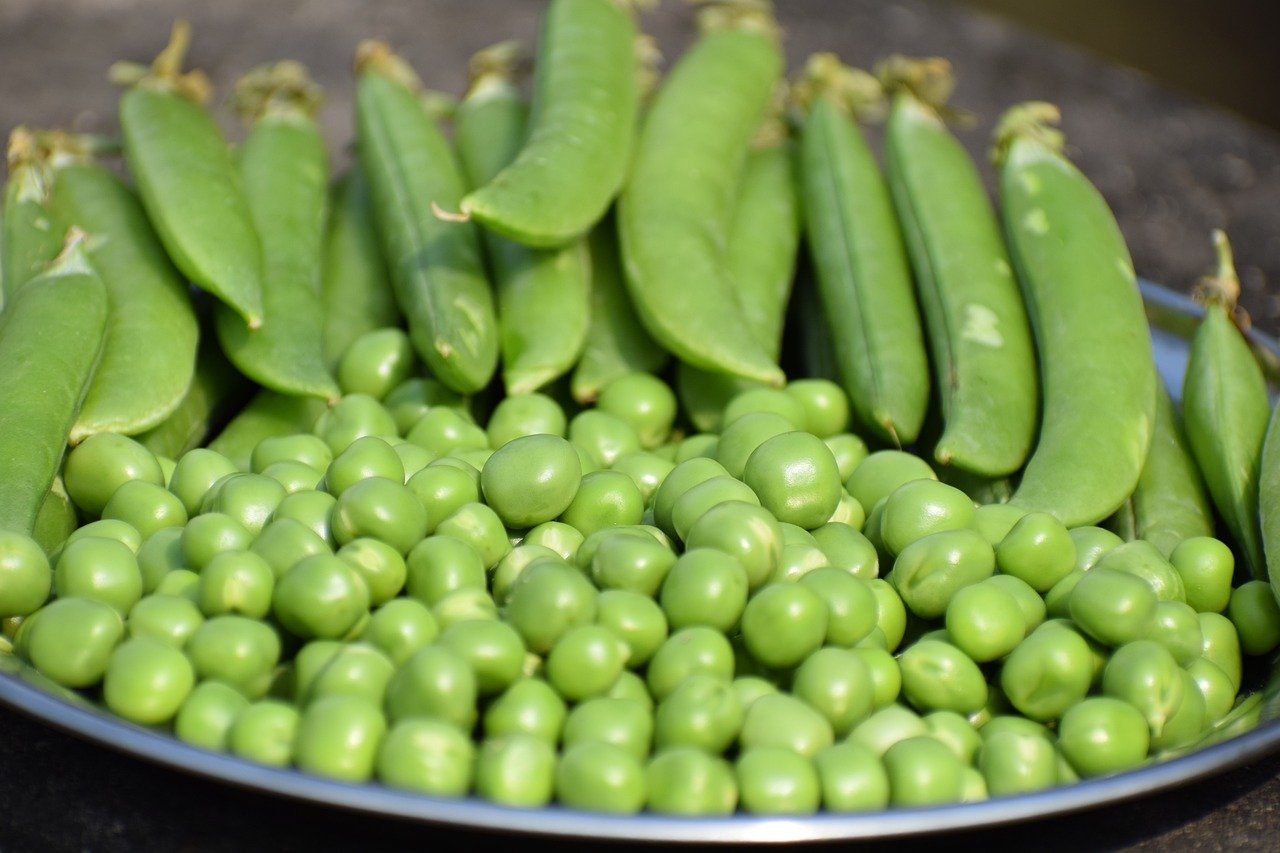
When it comes to the well-being of our furry friends, understanding their nutritional needs is crucial. This is where veterinary nutritionists step in, acting as the guiding light for pet owners navigating the complex world of pet diets. Unlike general veterinarians, veterinary nutritionists specialize in the intricate science of animal nutrition. They possess the knowledge and expertise to create tailored dietary plans that cater to the specific health needs of pets. Whether it’s a playful puppy or a wise old cat, these specialists ensure that every pet receives a diet that promotes optimal health.
One of the primary roles of a veterinary nutritionist is to assess the individual dietary requirements of pets based on various factors such as age, weight, health status, and lifestyle. For instance, a senior dog may require different nutrients compared to an energetic kitten. By evaluating these factors, veterinary nutritionists can recommend precise dietary adjustments that enhance overall health and prevent potential health issues down the line.
Moreover, veterinary nutritionists are equipped to address specific health conditions through diet. Pets suffering from ailments like diabetes, kidney disease, or obesity often need specialized diets to manage their conditions effectively. A veterinary nutritionist will analyze the pet's health records and create a customized meal plan that not only meets their nutritional needs but also supports their medical treatment. This tailored approach not only improves the pet's quality of life but can also lead to a significant reduction in veterinary costs associated with managing chronic health issues.
In addition to creating dietary plans, veterinary nutritionists also play a vital role in educating pet owners. They provide valuable insights into reading pet food labels, understanding ingredient lists, and debunking common myths about pet nutrition. For example, many pet owners are misled by marketing claims on pet food packaging, believing that a particular brand is the best choice without understanding the actual nutritional content. A veterinary nutritionist can help clarify these misconceptions, ensuring that pet owners make informed decisions.
Furthermore, the relationship between a veterinary nutritionist and pet owners is collaborative. By working together, they can monitor the pet's progress and make necessary adjustments to the diet as the pet ages or as health conditions change. This ongoing support is crucial for maintaining the pet's health and ensuring that they thrive.
To illustrate the impact of veterinary nutritionists, consider the following table that outlines the differences between general dietary advice and specialized nutrition plans created by veterinary nutritionists:
| Aspect | General Dietary Advice | Veterinary Nutritionist's Plan |
|---|---|---|
| Customization | One-size-fits-all | Tailored to individual needs |
| Health Conditions | Limited consideration | Specific dietary management |
| Ingredient Knowledge | Basic understanding | In-depth knowledge of nutritional science |
| Ongoing Support | Minimal follow-up | Regular assessments and adjustments |
In conclusion, the role of veterinary nutritionists is indispensable in ensuring that our pets receive the best possible nutrition tailored to their specific needs. With their expertise, they empower pet owners to make informed dietary choices that lead to healthier, happier lives for their beloved companions.
Q: What qualifications do veterinary nutritionists have?
A: Veterinary nutritionists typically hold a Doctor of Veterinary Medicine (DVM) degree, followed by additional training and certification in animal nutrition.
Q: How do I find a veterinary nutritionist?
A: You can consult your regular veterinarian for a referral, or search through professional organizations such as the American College of Veterinary Nutrition.
Q: Can I consult a veterinary nutritionist for homemade pet diets?
A: Absolutely! Veterinary nutritionists can provide guidance on creating balanced homemade diets that meet your pet’s nutritional needs.
Q: How often should I consult a veterinary nutritionist?
A: It’s advisable to consult them whenever your pet’s health status changes, or at least once a year to ensure their dietary needs are being met as they age.
Frequently Asked Questions
- Why is it important to consult a vet for nutritional advice?
Consulting a vet ensures that your pet receives a balanced diet tailored to their specific health needs. Vets have the expertise to identify nutritional deficiencies and recommend appropriate dietary changes, which can prevent serious health issues down the line.
- What are the essential nutrients my pet needs?
Pets require a variety of essential nutrients, including proteins, fats, carbohydrates, vitamins, and minerals. Each nutrient plays a crucial role in maintaining your pet's overall health, energy levels, and immune function. A vet can help you understand the right balance for your pet's specific needs.
- Are grain-free diets suitable for all pets?
Grain-free diets can be beneficial for some pets, especially those with specific allergies or intolerances. However, they’re not necessarily suitable for all pets. It’s essential to consult your vet to determine if a grain-free diet is appropriate for your furry friend.
- How can I tell if my pet has a nutritional deficiency?
Signs of nutritional deficiencies can include poor coat condition, lethargy, weight loss, and digestive issues. If you notice any unusual behavior or symptoms in your pet, it's crucial to seek veterinary advice promptly to address any potential deficiencies.
- What should I consider when choosing between commercial and homemade diets?
When choosing between commercial and homemade diets, consider factors like nutritional balance, convenience, and your pet's specific health needs. Commercial diets are often formulated to meet complete nutritional requirements, while homemade diets need careful planning to ensure they are balanced. Consulting a vet can help you make the best choice.
- How does my pet’s life stage affect their nutritional needs?
Pets have different nutritional requirements at various life stages. For example, puppies and kittens need more calories and specific nutrients for growth, while senior pets may require diets that support joint health and weight management. A vet can help tailor a diet that meets your pet's unique life stage needs.
- What role do veterinary nutritionists play?
Veterinary nutritionists specialize in formulating dietary plans that cater to the specific health needs of pets. They can provide tailored advice based on your pet's medical history and lifestyle, ensuring they receive optimal nutrition for their health and well-being.
- How can I manage my pet's weight effectively?
Effective weight management involves a combination of proper diet, regular exercise, and veterinary guidance. Your vet can help create a weight management plan that includes calorie control and appropriate feeding practices to help your pet achieve and maintain a healthy weight.
- What should I do if my pet has special dietary needs?
If your pet has special dietary needs due to health conditions like diabetes or kidney disease, it's vital to consult your vet. They can recommend specific diets that cater to these conditions, helping to manage your pet's health effectively.



